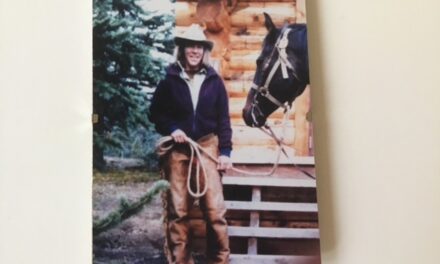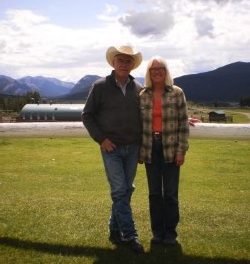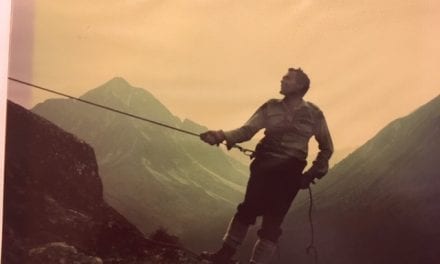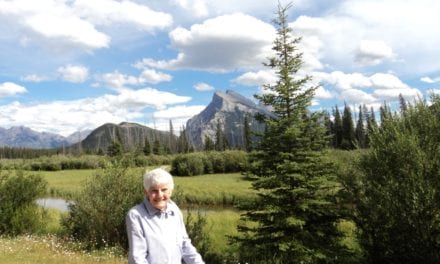Park Warden Alumni Society of Alberta Thank you to the Whyte Museum of the Canadian Rockies for granting permission to the Park Warden Service Alumni to post this interview on our website
Park Warden Alumni Society of Alberta
Oral History Project – Winter 2013
Interview with Scott Ward – Canmore Alberta
Interview conducted by Christine Crilley-Everts
December 28, 2012
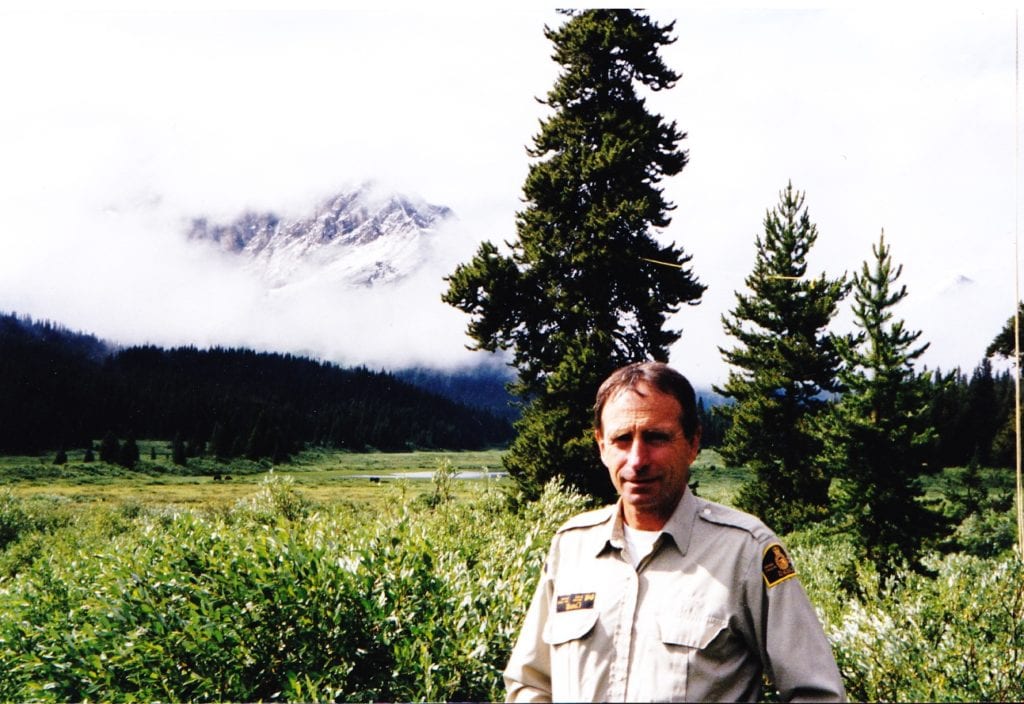
Place and Date of Birth: Edmonton, Alberta, 1949.
Occupations: In 1970, Scott became a seasonal warden in Banff National Park. Four years later he was a fulltime warden doing all aspects of the job from backcountry horse work to avalanche control and public safety. After visiting Pacific Rim National Park and falling in love with the beauty and uniqueness of the area he successfully applied for a job and learned all the skills required to work in a marine park. Following their three years on the west coast, the Ward family returned to Banff where Scott became the dog master for the park. For the next 17 years he worked with both the warden service and the RCMP as a dog handler, assisting on avalanche rescues, major searches and tracking down criminals at any time of the day or night. After retiring from his dog master position in 2000, Scott spent the last five years of his career as a backcountry warden. He then retired in 2005 after 35 years of service. The following year Scott was awarded the Governor General’s Peace Officer’s Exemplary Service medal for his work as a dog handler. Scott credits the success of his warden generation with their multifunctional role and ability to master the range of mountain skills required to successfully do their job from horse work to climbing and from mountaineering to alpine touring and skiing.
Additional Information: Since retiring Scott has started a very successful music career with the band, “The Wardens.” Along with his music he has travelled with his wife Wanda and daughter Jenna to various parts of the world. He also remains very active with the local ski club, teaching lessons and coaching biathlon during the winter months, as well as alpine touring. During the summer he is often mountain biking and hiking with his family including sons Roddy and Trevor. With a few other retired wardens, Scott still finds time to make the occasional trip into the backcountry.
“Did you grow up in Jasper?”
(0:17) I was born in Edmonton in 1949. No, we lived in Banff in the 1950s. Then my parents split up. My dad moved to Jasper and my mom moved to White Rock and I went back and forth between the two places. When I was in high school we moved to Vancouver and then I went back and forth between Vancouver and Jasper. So I did all my schooling, except for elementary school in Banff… was in White Rock and Vancouver.
Was that then what gave you a taste for the warden service, spending time with your dad?”
(1:06) Yeah, because he worked for the Canadian Wildlife Service and they did all the resource management of national parks in those days.) He was stationed in Parks and he was a fisheries biologist… In my high school years, he was running the fish hatchery in Jasper. He was the regional biologist for the mountain parks. So I spent every summer in Banff or Jasper since I can remember, except for three years in Pacific Rim. After high school I moved right back to the mountains and have been here ever since! Back to Jasper .
I had a summer job at the fish hatchery that my dad got me. He wasn’t in charge then, by then he had moved to Calgary. He was working in the head office for Parks in Calgary. They had a fisheries lab there. A guy by the name of Eldon Stone was running the fish hatchery. I worked a couple of summers at the hatchery and then I got on as a seasonal warden in Banff through a competition. I applied in 1969 and I got on in the spring of 1970. Pretty much, yeah, I stayed with it ever since then. I got on full time in 1974. I was always in Banff, except for those three years in Pacific Rim and one winter I was in Riding Mountain National Park. It was just while I was a seasonal and they had a hunting season open outside the park all winter. I went there for the winter to do boundary patrol basically
“What did you think of that after being in Banff?”
. I liked it, it was a nice change. I worked for an old guy named Archie, Archie Doan. He was probably about 60 at the time. He had 12 kids and he lived in a district on the edge of the park, near McCreary. He was outside of McCreary, Manitoba. At the entry to the Mount Agassiz ski hill there was, I don’t know if it is still there, but there was a warden station right on the boundary there. I lived in a seasonal cabin out behind it and I worked the winter. We just skidood up and down the boundary all winter basically. We went into little towns all around the park and had coffee. People would come up and tell us, “So and so is poaching an elk in the park.” Then we would go with our skidoos and investigate. People were constantly wounding elk and they would go into the park and we would have to go with them to get the elk. Yeah, they were hunting them, it was legal hunting. I was just there for about four months.
“Did you and Wanda meet in Banff?”
(5:02) Yeah, we met in Banff. She is from Montreal. She came in the early 1970s to work at the Jasper Park Lodge. Then she moved down to Banff and we met in Banff.
“What was it about the warden service that made you want to join?”
(5:36) When I was a kid I used to see them coming into the fish hatchery all the time to pick up fish. Or I would be out with my dad and I would see them on the trail riding by with the horses. I used to always figure that that looked like a pretty cool job. My dad tried to talk me out of it because in those days they didn’t have any education right? The wardens had maybe grade eight or nine and they were just like full on cowboys that they hired to go into the backcountry. I thought that was the coolest job and he wanted me of course to get an education. He had a master’s degree in biology, back then that was pretty significant. Nowadays it is not that much. But then it was very significant. He thought it would be a waste me going into the warden service. As it turned out the warden service required almost that level of education by the time I was done anyway. Not that I had it, but I was always really interested in it and I wanted to work with horses. It was kind of the horse job around that paid decently, asides for working for outfitters.
”What did you like best about being a warden?”
(7:05) Backcountry horse work that was my favorite part. I didn’t grow up riding horses?” I didn’t ride horses until I started with the wardens, I was only 20 and I was very interested in doing it. That was all that I ever wanted to do. So, I totally devoted myself to it for a number of years. I ended up just working with horses the first five years that I was on. In the summers I was exclusively doing horse work, packing up to fire lookouts and packing supplies into warden cabins. And in those days you took a stint on trail crew…My impression was when I first started, guys like Jack Woledge Jim Robertson, Bill Vroom and those guys, it was like your whole worth as a warden was judged on your horsemanship. So for the young guys if they were hired on and didn’t know anything about it, they either really got into it and learned it quickly and learned it well, or they didn’t last in the warden service basically…There was no horsemanship schools in those days, so you had to just survive right? I saw a few guys who showed up for work in the backcountry who came out and quit. There was lots of horseman around to teach you things in those days. They didn’t have formal schools, but you were travelling with guys who had been around horses all their lives. Guys like Bill Vroom and Jack Woledge and some of the trail crew guys like Johnny Nylund, Charlie Weatherly, guys like that. I learned a lot by traveling with them. Some of them you would learn just by watching and others would teach you. By the time I met Johnny Nylund I already had five years of horse experience. But I traveled with him quite a bit and hung out with him quite a bit and I would say that he probably taught me the most over the years, from that point on. He was an incredibly good horseman Johnny. So as I said, Johnny was one of my main mentors over the years.
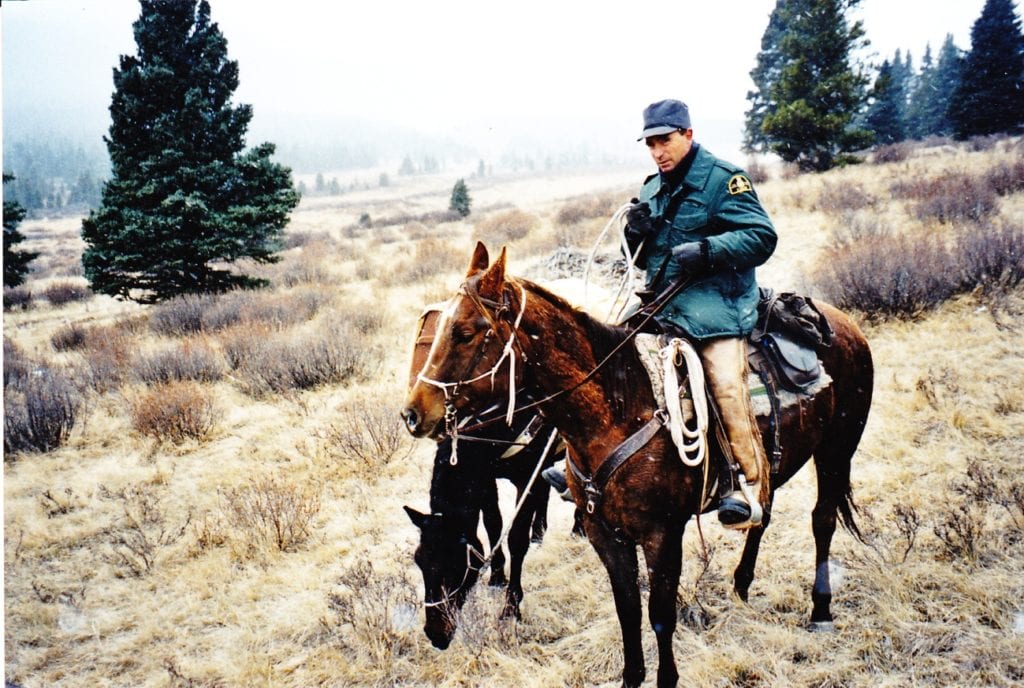
“You took over for Earl Skjonsberg then as the dog master?”
(10:24) I went to Pacific Rim first. I was in Banff for ten years, from 1970 until 1980. Then in 1980, I applied for a transfer to Pacific Rim. I had gone out to visit Traf Taylor who was a friend of mine. I worked with him in Lake Louise on avalanche control. He was stationed out there and I went out to visit him. The first time I saw the open pacific ocean, I was like “Holy!” I was just totally impressed. It was just a perfect blue bird day with these massive waves rolling in. It just looked like Hawaii to me. I thought, this is great, I want to work here. I said, “If there are ever any vacancies here, call me.” Harold Dougan who was a warden up there had a stroke and he had to resign. So there was a vacancy and Traf phoned me. Mac Elder was the Chief. I applied, I think there was ten of us who applied, but I was the only one who actually went out and talked to Mac. Mac thought that that was pretty neat, that I made that effort, so Mac gave me the job. We moved there in July of 1980. I really loved it, yeah. It was great.
“How did your duties compare?”
Well, I started off the first year and I was pretty useless because it was such a totally different environment, but then by the second year I was doing public safety that was my main responsibility for the park. I also did quite a bit of resource management too. So I supervised the surf guards and ran the rescue program and set up the training courses. That type of stuff. I had to learn how to surf and do surf rescue and how to operate boats on the open Pacific Ocean. I also got my scuba diving certificate. I was only there for three years, but I learned a lot of ocean skills in those three years. Nowadays they have jet skis for doing rescue in the surf, but in those days we had to paddle out and bring people in on big rescue boards. So, I used to practice that quite a bit. It was a board that was big enough that you could bring two people in on it. You didn’t do any fancy surfing with that, you just made it back through the waves with somebody else on the board. But we used to practice. We had our own boards and surfed all the time because the only way to get totally comfortable in that surf zone is to be a surfer. You had to build your paddling strength up and your knowledge on how to get out through the waves, your knowledge of all the rip currents and then develop your ability to be comfortable out there. It takes a couple of years of effort to do that. You know, being in the water at least four or five days a week. Our sons Roddy and Trevor were born out there. They were born in Port Alberni that was the nearest major hospital. They had a big 36 foot ocean going boat, it was like a commercial fish boat stripped down that was the park patrol boat. It was all radar equipped and it had pretty nice sleeping accommodation on board and everything. So I had to learn how to operate that boat, to take it over from Ucluelet to the Broken Group Islands and throughout the Broken Group Islands. You had a seasonal warden station in the Broken Group on a float cabin. I had to learn how to operate that boat within the first year to take it through all the different channels and stuff in the islands without running it aground. You didn’t want to go down in history as the warden who sunk the Sea Otter that was the name of the boat. I worked with Gordie McClain and Traf Taylor. They were the two guys who were there before me that were really good with the boats. So they sort of mentored me on the boat, until I felt comfortable with it. It took about a year. There were only three fulltime wardens in the park when I went there, Traf Taylor, myself and Gordie McClain. Then Traf left and Randy Chisholm took his place, so it was the three of us. Then we had six seasonals in the summer. A lot of the wardens that I worked with in Banff were seasonal (at Pacific Rim) like Frank Burstrom, Glen Peers, Ron Tessolini, they were all seasonal wardens when I was out there. Yeah, it was a completely different experience than Banff. I loved it. I still miss the place sometimes. I still like to go back and try surfing. It is one of those sports that you have to keep doing all the time. Even if you leave it for two or three years and go back you just get the shit kicked out of you by the ocean. But I still try! I am pretty pathetic about it now, compared to what I was like thirty years ago.
“What made you decide to come back to Banff?”
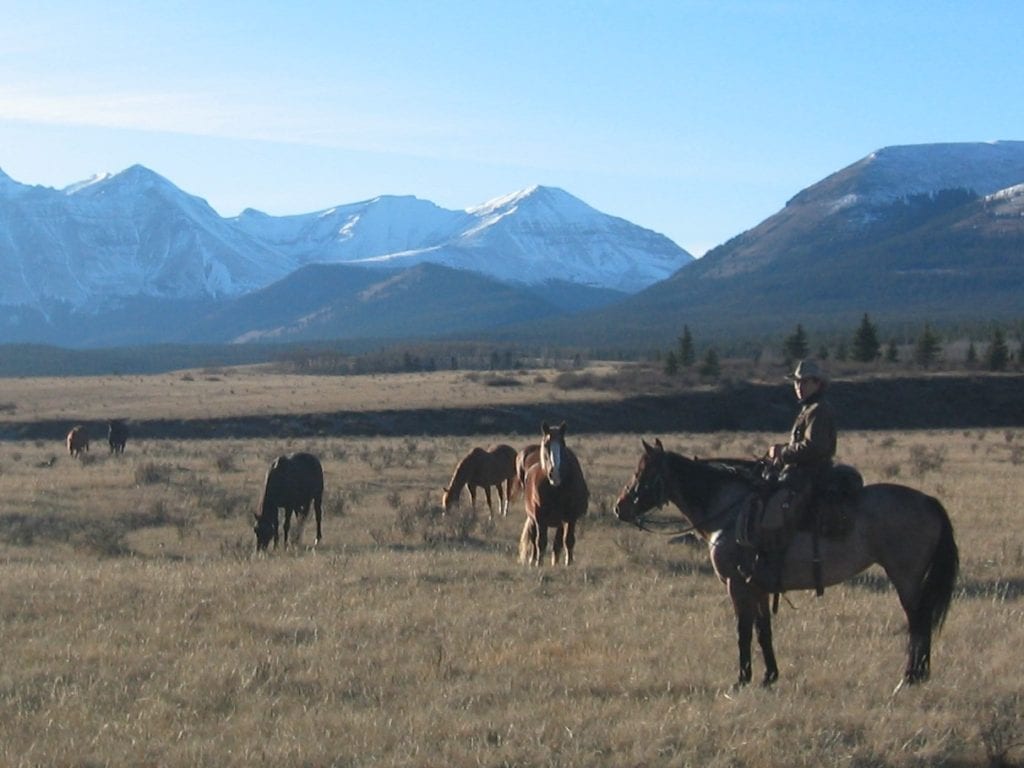
Scott – time to round up the horses for a backcountry patrol.
